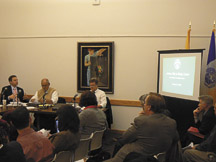The Jersey City City Council introduced at its Wednesday meeting four ordinances making Jersey City more like “Green City”.
The ordinances call for establishing environmentally friendly and energy efficient standards for city owned-buildings and future municipal projects including attaining the coveted LEED (Leadership in Energy & Environmental Design) certification from the U.S. Green Building Council; creating incentives for voluntary compliance by developers for green building standards; requiring city departments to purchase green products and materials, and fuel-efficient vehicles.
Also, the city is creating a committee made up of representatives from various city departments to oversee, and offer input on the implementation of the green initiatives once they are in place.
Also, the city’s corporation counsel Bill Matsikoudis said after Wednesday’s council meeting that Mayor Healy in the next few months will look to introduce an ordinance to ban plastic shopping bags in stores, which Healy has referred to as “urban tumbleweed”.
A PowerPoint presentation on the ordinances, crafted by Mayor Healy and his staff for over 18 months, was given to the council by Assistant Business Administrator John Mercer at Monday’s council caucus.
The ordinances will be up for a final vote at the next council meeting on Wednesday, Jan. 28, at 6 p.m. in the City Council Chambers at City Hall, 280 Grove St., and the meeting is open to the public.
Taking the green way
Matsikoudis spoke before the PowerPoint presentation on Monday of the ‘green’ ordinances saying the ordinances were the result of research by the city’s Law Department of similar ones in other cities across the country such as Los Angeles, New York and Portland, as well as consultation with environmental and energy conservation experts.
The ordinances establishing green building standards calls for all current and future municipal buildings to adopt standards based on the LEED system, which awards points and different levels of certification (Platinum, Gold, Silver, and Certified) based on six major criteria 74including sustainability, water efficiency, energy and atmosphere, materials and resources, indoor environmental quality and design. Exempted is construction in any city building deemed historic.
New city buildings currently under or close to construction that will adopt the LEED standards are the city’s new Public Safety Communications building on Bishop Street and Cornelison Avenue, and the new West District Police Station on Jackson Avenue. Completed buildings (not municipal projects) with LEED certification in Jersey City are the Goldman Sachs building on Hudson Street and the Concordia (St. Joseph’s) School for the Blind on Summit Avenue.
Another ordinance, pertaining to voluntary compliance for developers to erect buildings seeking LEED standards, would authorize incentives where developers receive back a certain percentage refund of building permit and land development application fees based on the level of LEED certification the building achieves. However, when City Councilman Michael Sottolano asked why developers are not mandated to build green buildings, Matskoudis said there are a “question of legality” and the city not wanting to put another impediment to construction.
A third ordinance amends the city’s municipal code to include a requirement for city departments to purchase green products and materials with certain stipulations such as if it does not exceed by 25 percent of the cost of comparable non-green product. And a fourth ordinance requires city departments to look at purchasing fuel-efficient vehicles including ones that operate on alternative fuels and/or hybrid of electric and gas.
Healy stands by his green initiatives
Mayor Healy when questioned about the coincidence of the green ordinances being introduced by the council four months before Jersey City’s May 12 mayoral election, Healy took offense to the question and defended the ordinances saying they were not “window dressing for an election”.
Healy cited the importance of the green initiatives by saying, “It not only preserves the environment and reduces our carbon footprint, but also saves money in the long run.”
Healy went on to say that the ordinances were close to his personal environmentally-friendly habits such as taking his own canvas bags when shopping at local supermarkets instead of taking his purchases home in plastic bags.
